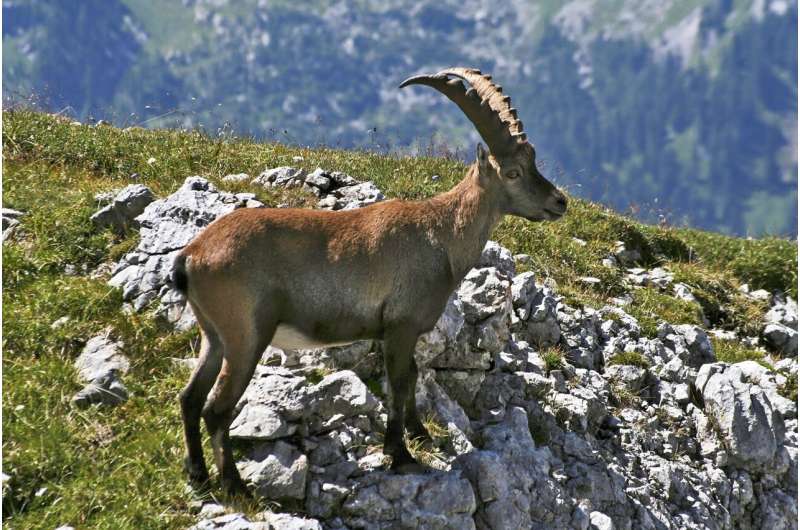by Bob Yirka , Phys.org
FEBRUARY 2, 2024


Credit: Pixabay/CC0 Public Domain
A team of biologists and veterinary scientists from the University of Sassari, Parc Naziunal Svizzer, Gran Paradiso National Park, and the University of Ferrara reports that Alpine ibex have been altering their grazing habits over the past several years in response to rising temperatures. In their study, published in Proceedings of the Royal Society B,, the group tracked the behavior of Alpine ibex living in a part of the Alps over the years 2006 to 2019.
Alpine ibex are a species of goat in the Alps. They feed primarily on grass, and typically do so by moving lower down the mountains during daylight hours to grassy areas so they can forage. In this new effort, the research team noted that temperatures in Gran Paradiso National Park, in the Italian Alps, have been slowly rising as part of global warming. That made them wonder how the Alpine ibex that live in the park were responding to the changes. To find out, they captured 47 of the goats in 2006 and attached motion sensing collars to track their movements.
The team found that on warmer days, the ibex became less active during the day, and more active at night. They noted that the move made sense as attempting to stay cool during hot days would use more energy than attempting to stay warm during the cool summer nights.
But it also came with a severe downside. Ibex are far more likely to fall prey to wolves when grazing at night because they are not as protected in grassy areas and cannot see the wolves approaching. The researchers suggest that the move to a more nocturnal lifestyle is not a viable behavioral change for the Alpine ibex over time due to wolf predation. As climate change progresses, the ibex are likely to become increasingly nocturnal, putting their survival at great risk.
The research team suggests that work like this demonstrates that some responses by wildlife may be overlooked by models that attempt to predict changes in environment due to global warming because of subtle behavioral changes.
More information: Francesca Brivio et al, Seeking temporal refugia to heat stress: increasing nocturnal activity despite predation risk, Proceedings of the Royal Society B: Biological Sciences (2024). DOI: 10.1098/rspb.2023.1587
Journal information: Proceedings of the Royal Society B
© 2024 Science X Network
A team of biologists and veterinary scientists from the University of Sassari, Parc Naziunal Svizzer, Gran Paradiso National Park, and the University of Ferrara reports that Alpine ibex have been altering their grazing habits over the past several years in response to rising temperatures. In their study, published in Proceedings of the Royal Society B,, the group tracked the behavior of Alpine ibex living in a part of the Alps over the years 2006 to 2019.
Alpine ibex are a species of goat in the Alps. They feed primarily on grass, and typically do so by moving lower down the mountains during daylight hours to grassy areas so they can forage. In this new effort, the research team noted that temperatures in Gran Paradiso National Park, in the Italian Alps, have been slowly rising as part of global warming. That made them wonder how the Alpine ibex that live in the park were responding to the changes. To find out, they captured 47 of the goats in 2006 and attached motion sensing collars to track their movements.
The team found that on warmer days, the ibex became less active during the day, and more active at night. They noted that the move made sense as attempting to stay cool during hot days would use more energy than attempting to stay warm during the cool summer nights.
But it also came with a severe downside. Ibex are far more likely to fall prey to wolves when grazing at night because they are not as protected in grassy areas and cannot see the wolves approaching. The researchers suggest that the move to a more nocturnal lifestyle is not a viable behavioral change for the Alpine ibex over time due to wolf predation. As climate change progresses, the ibex are likely to become increasingly nocturnal, putting their survival at great risk.
The research team suggests that work like this demonstrates that some responses by wildlife may be overlooked by models that attempt to predict changes in environment due to global warming because of subtle behavioral changes.
More information: Francesca Brivio et al, Seeking temporal refugia to heat stress: increasing nocturnal activity despite predation risk, Proceedings of the Royal Society B: Biological Sciences (2024). DOI: 10.1098/rspb.2023.1587
Journal information: Proceedings of the Royal Society B
© 2024 Science X Network
No comments:
Post a Comment